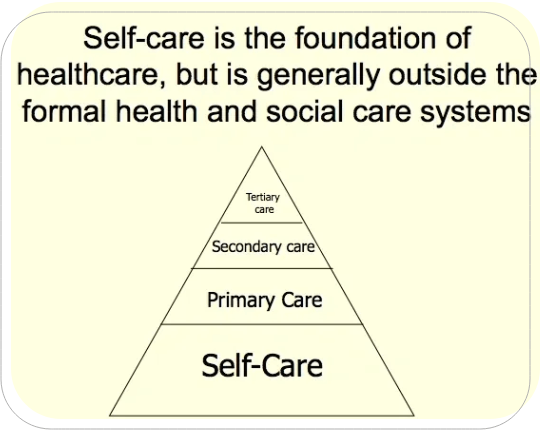
What is Self-Care
There are a number of definitions of self-care produced by different authorities at different times – the World Health Organization, for example, has produced three much-cited definitions (in 1983, 1998, and 2009). The WHO 1998 definition is:
Self-care is what people do for themselves to establish and maintain health and to prevent and deal with illness. It is a broad concept encompassing hygiene (general and personal), nutrition (type and quality of food eaten), lifestyle (sporting activities, leisure etc.), environmental factors (living conditions, social habits, etc.) socio-economic factors (income level, cultural beliefs, etc.) and self-medication.
Different definitions include or emphasize different aspects of self-care. A discussion of the different definitions of self-care has been published (Webber et al. Self-Care in Health: We can define it, but should we also measure it? SelfCare 2013 4(5): 101-106). The range of definitions of self-care, together with the broad and disparate activities that are part of self-care, can lead to definitions of this sort becoming unwieldy for practical purposes.
What is needed for practical implementation of self-care is a description of all the elements positioned from the individual’s point of view. ISF, therefore, proposes that a framework for self-care can conveniently be visualized and organized around seven ‘pillars’ or ‘domains’:
The focus of the International Self-Care Foundation is on self-care in the preservation of wellness in healthy people, to help prevent the epidemic of lifestyle diseases. This is where the greatest need lies currently. However, it is important to emphasize that self-care is also essential for people with an existing disease condition, and this is also sometimes referred to as ‘self-management’ of the condition.
Self-care is also usually the first treatment response to everyday health conditions and common ailments. Overall, an estimated 70% to 95% of all illnesses are managed without the intervention of a doctor.
Knowing when to consult a healthcare professional is a self-care skill under Pillar 1 (health literacy) and Pillar 2 (self-awareness).
Self-care is therefore the fundamental level of health care in all societies and should be seen as a major public health resource. Yet self-care is often unrecognized and underappreciated, leading to comparisons with the invisible majority part of an iceberg below the surface, or to a hippopotamus in those countries in latitudes less familiar with icebergs.

